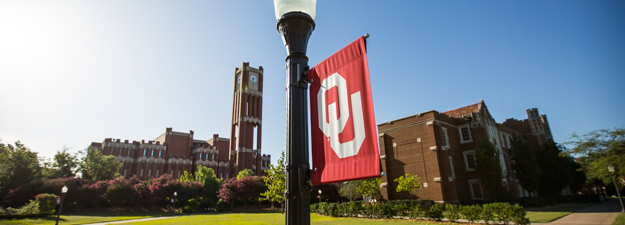


Here at the University of Oklahoma, students in our program pursue an interdisciplinary curriculum in history, literature, philosophy, and language.
Our Classics program focuses on ancient Greece and Rome through their languages, literature, and culture. Students who major in Classics learn about the role Classical tradition played in the development of literature, arts, culture, and politics since antiquity.
Students in the Letters program pursue a liberal arts education that is developed from courses in history, literature, philosophy, and language. The flexibility of the Letters curriculum allows students to develop a curriculum customized to their interests.
Contact us to learn more about one of the original programs at the University of Oklahoma!

CLASSICS AND LETTERS COURSE CATALOG
Search OU's course catalog to view our current course offerings!

MEET WITH A CLASSICS AND LETTERS ADVISOR
Meet with a faculty or academic advisor to check your Classics or Letters degree progress and lift advising holds.

Contact the Classics and Letters department for answers to your questions.
The Signature Study Abroad Program for the Department of Classics & Letters returns. The political institutions, scientific advancements and literary accomplishments of Ancient Rome have left an indelible mark on Western history and were avidly restored and extended during the Renaissance. This course will take students on a journey through the history, art, architecture, and literature of Roman and Renaissance civilization on site in Italy June 5–19, 2026.
Learn More: Roman Italy & The Renaissance Details and Itinerary
In keeping with the wisdom and tradition of placing the study of ancient Greece and Rome at the heart of a strong curriculum the liberal arts and sciences, President David Ross Boyd selected a classicist, William N. Rice, as the first member of the University of Oklahoma’s faculty in 1890.
Rice’s successor, Joseph Paxton, wrote the university’s motto, Civi et Reipublicae (“for the benefit of the citizen and the state”), stating in nuce the university’s institutional mission of providing the “best possible educational experience for our students through excellence in teaching, research and creative activity, and service to the state and society.”
From the Athenian drachma and the Roman sestertius featured above the south doorway of Adams Hall, to the Ionic column symbolizing humanistic learning in the College of Arts and Science’s logo, the Classical tradition has always been an important part of the University of Oklahoma, and the Department of Classics and Letters has always supported the university’s mission through research and teaching in the languages and cultures of ancient Greece and Rome and their enduring influence on the modern world.
In 1937, the School of Letters was organized to “provide systematic instruction in ancient and modern languages, history, philosophy and comparative literature,” an Oklahoma Daily writeup from that year concluded.
A few years later, the School of Letters became a planned program of the College of Arts and Sciences, under the guidance of a committee of faculty members from the core departments of Classics, English, History, Modern Languages, and Philosophy. In 1953, under the direction of Philip J. Nolan, the Classics Department became the administrative home of the Letters program. Since then, the Chair of the Department of Classics also serves as the Director of the Letters program.
To reflect the department’s long-standing commitment to the Letters program and the outstanding job it has done administering it, the department’s name was changed to the Department of Classics and Letters in 1996.
In 2009, President David Boren established the Institute for the American Constitutional Heritage, or IACH, within the Department of Classics and Letters out of a desire to promote an interdisciplinary, humanistic approach to the study of the Constitution and constitutionalism.
From its earliest days, the Department of Classics and Letters has supported OU’s institutional mission by promoting free inquiry and the perpetuation of the humanistic tradition.
Through teaching, scholarly and creative activity, and service, the Department of Classics and Letters seeks to preserve and promote the study of the culture, history, languages, literature, and philosophy of Greco-Roman antiquity and the enduring influence of Classical ideals on the modern world.
Expanded Statement of Institutional Purpose
The principal mission of the Department of Classics and Letters' curricular program is to provide a traditional liberal arts education that will prepare students to adapt to a variety of settings after graduation. Our programs are based upon the assumption that cultivated intelligence, good judgment, and artistic expression in speech and writing are desirable in and for themselves.
Each of the department's major programs, in addition to fulfilling this principal mission, has its own specific purpose and goals.
Classics
The principal mission of the curriculum in Classics is to educate students about ancient Greek and Roman civilizations.
The three emphases within Classics have distinct goals:
Letters
The principal mission of the curriculum in Letters is to provide students with a traditional, interdisciplinary education in the liberal arts and sciences through courses both in the Department of Classics and Letters and in other departments.
To build on the strength and reputation for excellence that the department has enjoyed since the earliest history of the University of Oklahoma, our goals are:
Some universities have adopted mottoes that celebrate a suitably lofty ideal, like Veritas (Truth) or Lux (Light); some have combined the two, Lux et Veritas, for good measure. The University of Oklahoma’s motto expresses a much more practical goal: Civi et Reipublicae, “For the benefit of the Citizen and the State.” Along with the accompanying image of a farmer sowing fields in a recently plowed field on the university’s great seal, the motto speaks volumes about the purpose of higher education in Oklahoma: the seeds of knowledge should grow and yield a better future for the citizens and their state.
So why is the motto in Latin, a language hardly ever associated with anything practical?
A Latin motto connects the university to a grand tradition of education that stretches back through the ages to a time when Latin was the only practical language for the study of science, medicine, mathematics, history, literature, philosophy, and theology. The international language –– or lingua franca –– for centuries, Latin was the foundation of education, so it is appropriate for the University of Oklahoma to pay tribute to tradition with a motto in Latin.
Having a Latin motto on the great seal also delivers the message that higher education is hard work. It takes hard work to plow a field, sow it with seeds, tend the plants, and harvest the crops. The farmer on the great seal knows that. It also takes hard work to learn new things, like a new language, or a new way of looking at the world, but the work yields tremendous, life-sustaining benefits.
Because Latin is no longer a requirement in high school, the majority of people who look at the university’s seal for the first time will not know what the motto says. That does not mean that the university wishes to reserve knowledge for the elite few who know Latin. Rather, it means that even the university’s seal presents people with the opportunity to learn something, to sow a new seed of knowledge. Imagine what they will learn from our classes!
Even those who know a little bit of Latin might find our motto confusing. Unlike the mottoes of Harvard or Yale, the University of Oklahoma’s motto is not just an abstract noun, but an inflected form with complex syntax — not something that can be translated easily with just a dictionary. Scholars of Latin know the grammatical construction as the dative of advantage, which is why the motto means “for the benefit of the citizen and the state.” Here again the motto places emphasis on practicality; if we are going to have Latin on our seal, then the words should be doing something, not just standing for an abstract ideal.
Not everyone who comes to the University of Oklahoma will study Latin (even though we believe that they should, along with ancient Greek!), but those who do will become part of an unbroken tradition that stretches back to the earliest days of the university. Their Latin vocabulary will inform them that liberal education has nothing to do with politics, but with liberating (from Latin liberare) people from the shackles of ignorance.
Those who go on to careers in law will understand the meaning of stare decisis and habeas corpus. Those who go on to careers in medicine will know when to yell “Stat,” and when to administer a placebo. And those who simply take Latin for its intrinsic value will come away from the experience not only with a greater command of grammar, style, and vocabulary in English, but also an appreciation for what people have known for centuries: that the study of Latin (and Greek!) benefits citizens and their states by cultivating an atmosphere of erudition.

Madeline Woodard presented “Amphorae of Ancient Umbria: Trade in the Ancient Roman World Through Pottery“ at the Undergraduate Research and Creative Activity Showcase 2025.